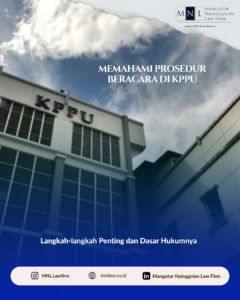
The Indonesian Competition Commission (KPPU) plays a central role in maintaining a healthy business competition climate in Indonesia. As a quasi-judicial institution, KPPU carries out oversight, law enforcement, and dispute resolution functions related to violations of competition law. The procedural practice in KPPU has its unique characteristics, distinct from general courts. This article provides an in-depth review of how procedural practice in KPPU is conducted and its legal basis.
Legal Basis and Authority of KPPU
The legal foundation for KPPU is outlined in Law No. 5 of 1999 concerning the Prohibition of Monopolistic Practices and Unfair Business Competition (Law No. 5/1999). Additionally, KPPU Regulation No. 1 of 2019 on Procedures for Handling Cases (Perkom 1/2019) serves as the technical guideline for procedural practice in KPPU.
Under Article 36 of Law No. 5/1999, KPPU is authorized to:
- Assess agreements or business activities suspected of violating competition law.
- Conduct investigations of business actors.
- Impose administrative sanctions for proven violations.
Stages of Procedural Practice in KPPU
Procedural practice in KPPU involves several stages, from preliminary examination to the final decision. The stages are as follows:
- Preliminary Examination
This stage begins with a report from the public or an initiative finding by KPPU. Upon receiving the report, an investigation team conducts an initial inquiry. Based on the findings, it is determined whether sufficient evidence exists to proceed to the advanced examination stage.
- Advanced Examination
If the preliminary examination reveals suspected violations, the case moves to the advanced examination stage. Here, a panel of commissioners leads the hearing process. The reported party is given the opportunity to present a defense, provide evidence, and submit witnesses.
Follow-Up Hearing Points in the KPPU Agenda
- Identification and Validation of Initial Evidence
- Re-examination of initial evidence found during the preliminary stage.
- Validation of the relevance of the evidence to the alleged violation.
- Summoning and Examination of Parties
- Summoning the reported party to attend the hearing.
- Taking statements from the complainant, expert witnesses, and factual witnesses.
- Examination of Documents and Additional Evidence
- Evaluation of documents submitted by the complainant and the reported party.
- Analysis of correspondence, contracts, or other records relevant to the case.
- Presentation and Verification of Facts
- Presentation of facts by both parties before the commission panel.
- Assessment of consistency between the reported party’s statements and the submitted evidence.
- Submission of Expert Witnesses
- Both complainant and reported party may submit expert witnesses to strengthen their arguments.
- Cross-examination of expert witnesses presented.
- Violation Analysis
- In-depth analysis by the commission panel on the alleged violation.
- Application of relevant legal bases under Law No. 5 of 1999 and KPPU Regulation 1/2019.
- Evaluation of Legal Compliance
- Review of the reported party’s compliance with competition regulations.
- Identification of the potential impact of violations on the market and other businesses.
- Interim Findings
- Presentation of interim findings by the panel.
- Allowing the reported party to provide additional defenses.
- Commission Panel Deliberation
- Internal discussion among the commission panel to draft the decision.
- Determination of the severity of the violation and the type of sanctions to be imposed.
- Decision and Follow-Up
- Announcement of the decision to the parties.
- Providing the reported party with time to file objections if necessary.
- Decision
After the hearing, the panel of commissioners deliberates to issue a decision. KPPU’s rulings are administrative, including sanctions such as fines or orders to cease unlawful activities.
- Legal Remedies
If the reported party is dissatisfied with KPPU’s decision, they may file an objection to the District Court in accordance with Article 44 of Law No. 5/1999. This must be done within 14 days after receiving KPPU’s decision.
Unique Aspects of Procedural Practice in KPPU
Procedural practice in KPPU has several unique features compared to general courts, including:
- Quasi-Judicial Nature: KPPU combines oversight and law enforcement functions. As an administrative institution, KPPU lacks jurisdiction over criminal or civil matters.
- Administrative Sanctions: KPPU’s decisions are limited to administrative sanctions, such as fines and corrective orders.
- Public Interest Focus: The process prioritizes restoring a healthy competition environment over individual punishment.
Conclusion
Procedural practice in KPPU embodies the government’s commitment to enforcing healthy competition principles in Indonesia. With a strong legal basis and transparent procedures, KPPU protects business actors while ensuring justice in the business world. For business actors, a thorough understanding of this process is essential to avoid potential violations and ensure business sustainability.
KPPU, with its complex tasks, stands at the forefront of safeguarding fair business competition in Indonesia. Through its structured procedural practice, this institution significantly contributes to creating a competitive and integrity-driven economic ecosystem.
